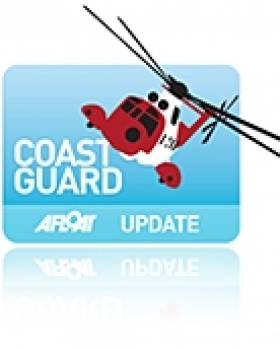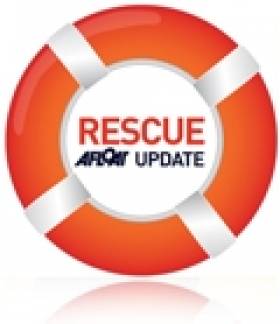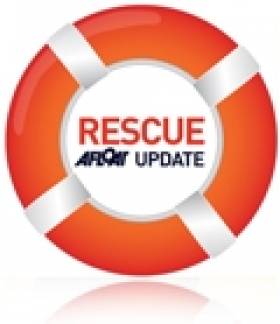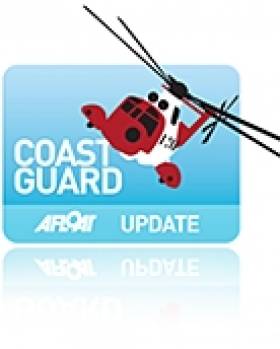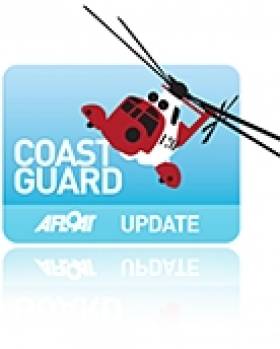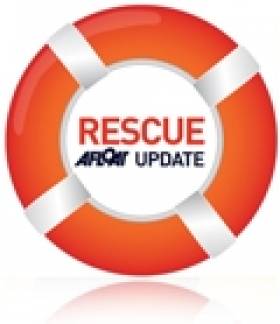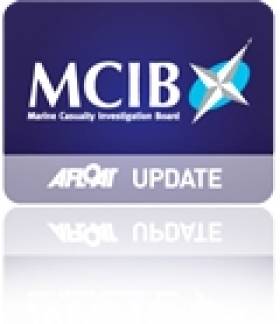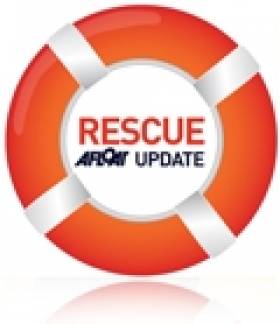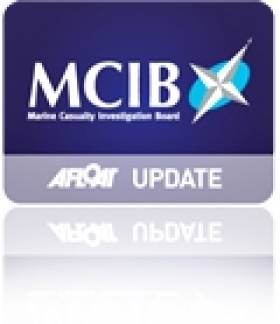Displaying items by tag: helicopter
Coastguard Helicopter Gets State-Of-The-Art Imaging Systems
#COASTGUARD - Canada's L-3 Wescam has announced it will be providing electro-optical and infrared imaging systems for the Irish Coast Guard's revamped search and rescue helicopter fleet, starting with the new Sikorsky S-92 based at Shannon.
“This order pairs the most modern SAR helicopter with the most advanced EO/IR sensor to provide a vital capability for lifesaving missions,” said Paul Jennison, vice president of government sales and business development for L-3 Wescam.
The company describes its MXTM-15 system as a one-line replacement unit solution, which reduces installation weight by 25% and increases much-needed cabin space for transporting rescue victims.
The system’s digital infrared camera is capable of a 20% increase in visual range, allowing missions at night or in inclement weather to result in a higher search success rate.
In addition, the system comes with WESCAM’s MX-GEO Gen 3 software package which helps deliver maximum geographic location accuracy and significantly reduces operator fatigue that often arises in demanding and stressful SAR operations.
Imaging system upgrades are expected to be rolled out across the Irish Coast Guard's helicopter fleet by the end of next year.
Search Scaled Down for Missing Crewman in Irish Sea
#RESCUE - BBC News reports that the search for a cargo ship crewman missing in the Irish Sea has been scaled down.
The 22-year-old from Slovakia was reported missing yesterday morning from the Fehn Sirius, which was en route from Belfast to Portugal, as it headed past Arklow, Co Wicklow.
According to The Irish Times, he was last seen on the cargo ship around 10pm on Monday night as it headed south of the entrance to Strangford Lough.
Lifeboats from Portaferry and Newcastle in Northern Ireland and Arklow joined the search and rescue operation, which was assisted by the RAF helicopter based at Prestwick in Scotland and an Irish Coast Guard helicopter.
However, most rescue services have now been stood down as the Fehn Sirius continues to backtrack in the Irish Sea, with assistance from the Naval Service vessel LE Ciara.
Only three days ago the body of another mariner was recovered from the Irish Sea off the north Dublin coast, more than a month after he went missing.
Scottish Search and Rescue Base UK's Busiest in 2011
#RESCUE - The Royal Navy search and rescue unit at HMS Gannet was the busiest in the UK last year, STV News reports.
The unit - based in Prestwick, near Glasgow - responded to nearly 300 call-outs and rescued 240 people in Scotland, northern England and Northern Ireland throughout 2011 with its fleet of Sea King helicopters.
The big numbers put HMS Gannet at the top of the UK's 12 search and rescue units for the fifth year running.
"Like all emergency services, we work under significant pressure and always aim to provide the best service we possibly can," said HMS Gannet's Lieutenant Commander Debdash Bhattacharya. "Frequently lives depend on it."
Since 2007 the unit has rescued 1,575 people from 1,865 call-outs in total. Last year's call-outs represented 17% of all call-outs from military bases in the UK.
STV News has much more on the story HERE.
Coastguard Takes Delivery of New Chopper
#COASTGUARD - The Irish Coast Guard has taken delivery of its new search and rescue helicopter at its Shannon base, The Irish Times reports.
As previously reported on Afloat.ie, Sikorsky completed production of the new S-92 helicopter for the Irish Coast Guard last December under the rescue service's €500 million deal with CHC Ireland to revamp the aircraft fleet.
The deal will also see the coastguard's remaining four Sikorsky S-61s replaced by second-hand S-62s from Scotland over the coming months.
Training with crews at Shannon is set to begin shortly ahead of the S-92's first public demonstration at the centenary of the Titanic’s departure from Cobh in Cork Harbour.
Meanwhile, it is expected that the Air Corps may be offered an upgraded air ambulance role, after they were ruled out as contenders for search and rescue work amid some controversy.
The Department of Health has reportedly been in exploratory talks with private firms regarding the provision of an inter-hospital emergency air transfer service, as called for by the Roscommon Hospital Action Group.
The Irish Times has more on the story HERE.
Italian Coastguard to Deliver Keynote at Dublin Conference
#COASTGUARD - Representaives of Italy's coastguard will give an account of its handling of the Costa Concordia tragedy at an international conference in Dublin next month, The Irish Times reports.
The Italian coastguard has been invited to deliver the keynote address at Search and Rescue 2012, which is being hosted in Ireland for the first time.
It is expected that this address will include a detailed account of the sinking of the cruise liner Costa Concordia last month.
At least 17 people have died and 12 are still missing after the ship ran aground on the western Italian coast. One Irish couple were among the thousands rescued from the stricken vessel.
Meanwhile, attendees at the conference - which is being hosted in the year of Ireland's charing of the EU coastguard network - will also witness demonstrations of the Irish Coast Guard's rescue helicopter fleet at Weston Airport in Leixlip.
As previously reported on Afloat.ie, Irish Coast Guard director Chris Reynolds has been charged with preparing the grounds for a permanent secretariat to be run by EU coastguard officers.
Body Recovered as Search for West Cork Fishermen Continues
#RESCUE - Garda divers have this morning recovered a body in their search for the crew of the fishing vessel Tit Bonhomme off the coast of West Cork.
As previously reported on Afloat.ie, five of the six-person crew went missing after the boat ran aground and went down rough seas near Adam's Rock, at the mouth of Glandore Harbour.
The five men include skipper Michael Hayes from Helvic Head in Co Waterford, Dubliner Kevin Kershaw (21) and Egyptians Said Mohammed (23), Wael Mohammed (35) and Attea Ahmed Shaban (26).
RTÉ News reports that the body recovered this morning has not been identified, but it is believed to be that of an Egyptian national.
Dive teams from the Garda and Naval Service have been set back by the trawler's position wedged in a narrow inlet with strong wash and backwash on either side, but were said to have made "significant progress" during dives yesterday.
A broader search is also being conducted inside and outside the harbour area and surrounding coastline, assisted by fishing boats, Irish Coast Guard rescue helicopters, and small boats and kayaks.
Report into Death of Crab Fisherman Prompts Call for Review of Stability Standards
#MCIB - The Marine Casualty Investigation Board (MCIB) has recommended a ministerial review of stability standards for fishing vessels following its report into the death of a crab fisherman off Co Cork in January last year.
Gerry Hegarty drowned after a wave struck the crab boat Carraig An Iasc, which was fully loaded with crab pots at the time, causing it to capsize and sending its two-man crew into the water.
Hegarty, who was not wearing a personal flotation device (PFD) or other buoyancy aid, got into difficulty while attempting to swim ashore with his crewmate and skipper James Fitzgerald, who subsequently raised the alarm.
Lifeboats from Ballycotton and Crosshaven, as well as Irish Coast Guard helicopter Rescue 117, were tasked to the incident. Divers from Naval Service vessel LE Emer located the sunken crab boat but no body was found.
A coastguard search of the area continued over a number of days without success. Hegarty's body was eventually recovered on 17 February 2011 at Ringabella Strand in Co Cork.
The MCIB found it probable that the Carraig An Iasc encountered wind or wave action or a combination of both that caused the vessel to heel to an angle beyond which it was able to recover from its loaded condition. The vessel's Code of Practice Declaration of Compliance was valid until 15 July 2013.
The board noted that there have been "a number of incidents caused by overloading boats thus effecting stability", and recommended that the Minister for Transport reviews and revises the stability standards in the current Code of Practice to improve these standards.
It was also recommended that a safety notice be issued to all skippers and owners in the fishing fleet reminding them of their legal responsibility to ensure that all their crew wear PFDs or lifejackets while on deck.
The full report is available to download as a PDF from the MCIB website HERE.
- Crosshaven
- Cork
- Safety
- Fishing
- Ballycotton
- Lifejacket
- Lifeboat
- Marine Casualty Investigation Board
- Coastguard
- Irish Coast Guard
- Skipper
- naval service
- helicopter
- MCIB
- Rescue 117
- personal flotation device
- Minister for Transport
- LE Emer
- standards
- drowned
- crab fishing
- Carraig An Iasc
- Gerry Hegarty
- James Fitzgerald
- PFD
- Ringabella Strand
- Code of Practice
- stability
- overloading
Air Corps Patrol Assists in Rescue of Injured Fisherman
#RESCUE - The Irish Times reports that an Air Corps maritime patrol aircraft joined a search and rescue mission to evacuate a fisherman off the West Cork coast today.
The Casa CN 235 - one of two operated by the Air Corps - diverted from its daily patrol to provide a communications relay in the operation to rescue an injured crewman from a Spanish fishing boat some 100 miles south of of Castletownbere.
The fisherman was airlifted by an Irish Coast Guard helicopter which at last report was taking him to medical attention in Cork.
Epilepsy, Lack of Lifejacket Big Factors in Death of Dublin Boatman - MCIB
#MCIB - The death by drowning of a South Dublin boatman may have been avoided had he been wearing a lifejacket or buoyancy aid, according to investigators.
The report by the Marine Casualty Investigation Board (MCIB) into the death of Aidan Fennell off Dalkey Island on 12 October 2010 found that an epileptic episode could have caused him to fall overboard from his rowboat and become disorientated once in the water.
Fennell, 43, was considered a competent boatman and a strong swimmer used to cold water, though was prone to seizures where he could not control his muscles and lost sense with reality, on occasion becoming unconscious.
On the afternoon of 12 October last year Fennell had launched his boat from Coliemore Harbour in fair conditions, intending to ferry a German family to Dalkey Island. When they pulled out of the trip, Fennell decided to row to the island on his own, with no flotation devices on board.
He was last seen by friend Kevin O'Farrell at 2.50pm. Around half an hour later, O'Farrell became concerned as to Fennell's whereabouts when he had been out of sight for some time.
After notifying the Irish Coast Guard, the Dun Laoghaire lifeboat and coastguard helicopter Rescue 116 were dispatched to search the area. Fennell's boat was located before 4pm washed on the rocks at the southeast end of Dalkey Island, and his body was found in the water close by some 10 minutes later.
No injuries were found on Fennell's body, suggesting that he went into the water before his boat washed up on the rocks.
The report concluded that if he had fallen overboard in normal conditions "it is considered likely that he could have swum to his boat, or clung on to the oars.
"However, if he had suffered an epileptic episode... he would have had great difficulty in staying afloat, in particular without having the buoyancy assistance of a life jacket."
The full report is available to download as a PDF from the MCIB website HERE.
Marine Escapes Cuts in Latest Budget
#BUDGET - Coastguard and lifeboat services, mountain rescue and the Commissioners of Irish Lights will not face any further funding cuts in the latest Budget, according to the Minister for Transport.
The Irish Times reports that, following the reduction of his department's budget, Minister Leo Varakdar stated that substantial cuts have already occurred in the maritime safety sector.
Moreover, he announced an increase in the maritime budget from €70.5 million to €80.3 million, due to provisions for the new Irish Coast Guard helicopter contract.
Earlier this week, Minister for Agriculture, Food and the Marine, Simon Coveney, underlined the importance of the marine sector to Ireland's coastal communities.
As previously reported on Afloat.ie, Minister Coveney announced a round of expenditure estimates on Monday which include increased funding for investment in processing, aquaculture and fishery harbours.



























